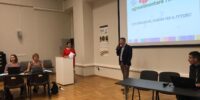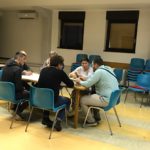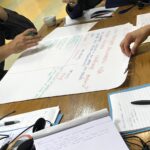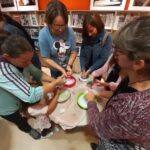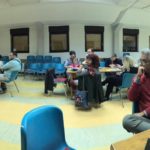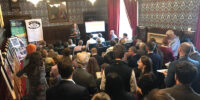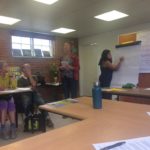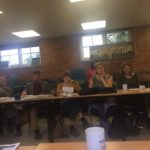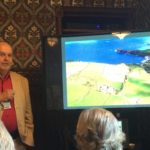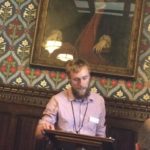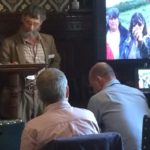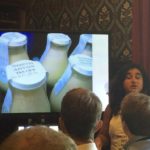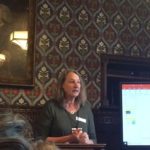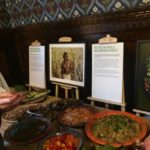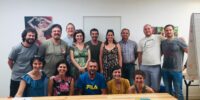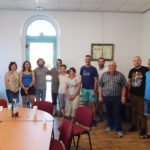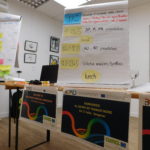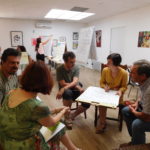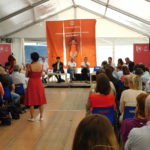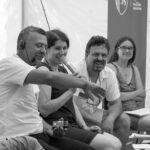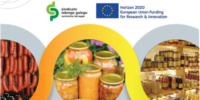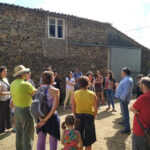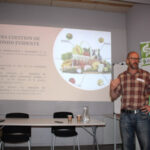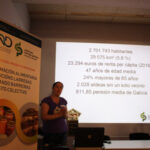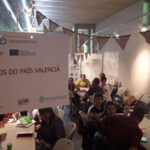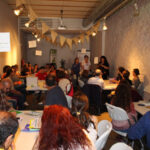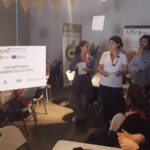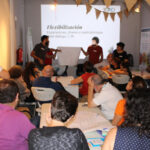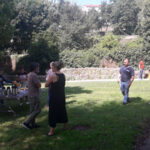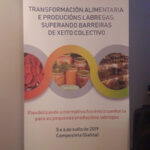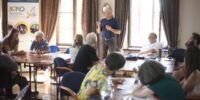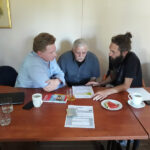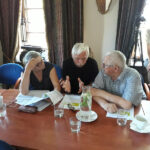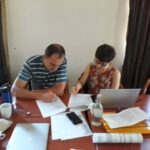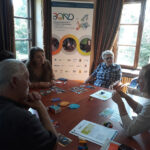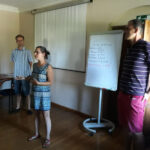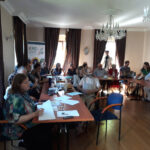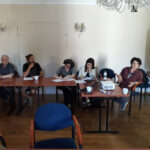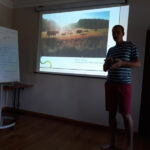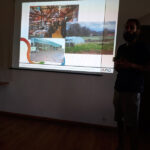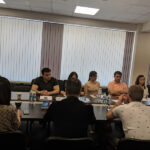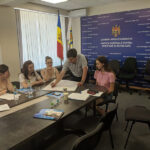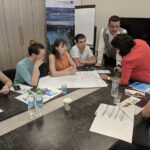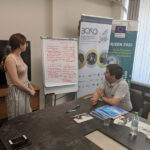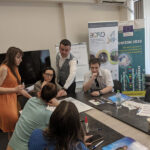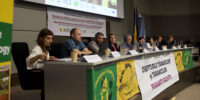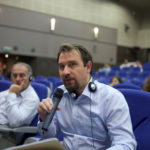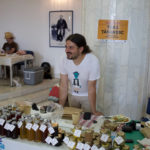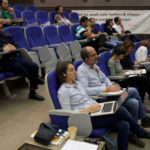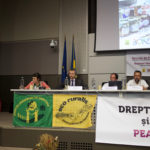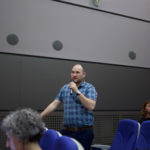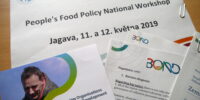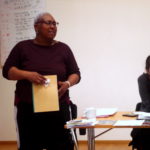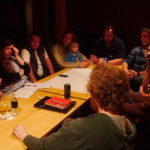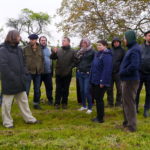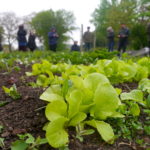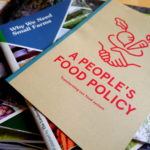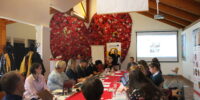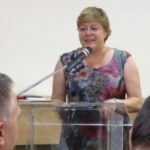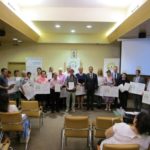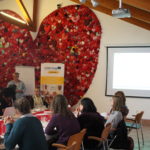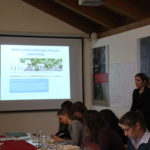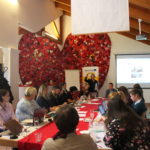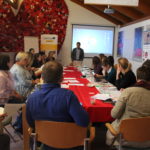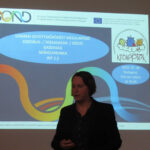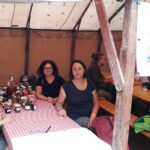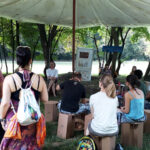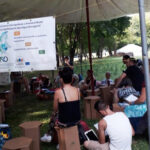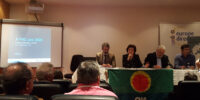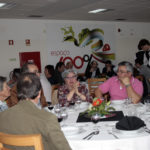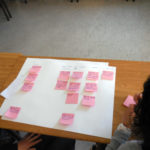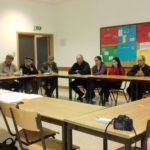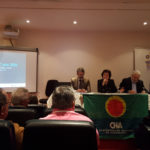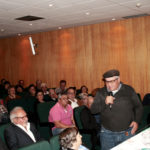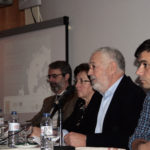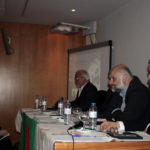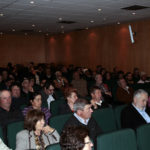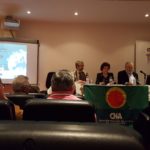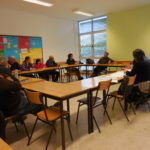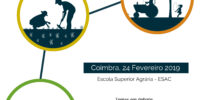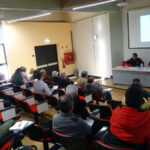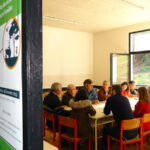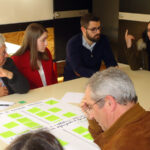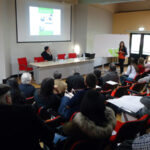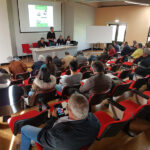10 national workshops were organised in Portugal, Republic of Moldova, Romania, Czech Republic, Hungary, Poland, Italy, Spain, UK and France, with the different stakeholders to work in three thematic roundtables: sustainable farming, access to markets and environmental sustainability. Other related areas and themes were: access to credit, access to natural resources, the importance of coordinated action by pooling resources and knowledge, the importance of federating into apexes for certain services/activities, to use and apply the processes and trainings developed for the groups to build their own strategy and action plan networking and reaching higher levels of collective work and aggregation into apex bodies in the different thematic areas.
National thematic workshop
Legacoop Agroalimentare organised a National Workshop at the Technological Pole and the Mariapolis Faro center in Krizevci (Zagreb, Croatia) from 25 to 27 September, in collaboration with the Croatian agricultural cooperatives and associations.
The workshop introduced different types of farms from small-scale biodynamic farms to a more complex structure such as a cooperative producing cereals and beef with export-import relations with the European Union and also other countries of the world. In particular, during the event, was discussed on regenerative agriculture, as a method to restructure the soil and improve its production capacity which, otherwise, in the current consumption rates will be exhausted over the next 60 years.
The Italian experience of the community cooperative Torri Superiore in Liguria and the Norwegian advanced cooperation in the collection of milk, meat, and cereals were among the models disclosed.
During the three days, the participants had the opportunity to exchange ideas, to debate, to build a common vision and to compare their experiences.
The workshop closed on the third day with a practical case, in which an attempt was made to use an action plan for the revitalisation of a rural village.
National thematic workshop
Landworkers’ Alliance was pleased to host their national workshop on September 10 and 11 with the All Party Parliamentary Group on Agroecology, Sustain, Campaign for the Protection of Rural England, Soil Association and Organic Farmers and Growers and the Gaia Foundation in the UK parliament showcasing some fantastic farmers and growers using agroecological and organic systems across their whole farm.
The room was packed with people, including about 40 MP’s, plus more decision makers- Lords, Ladies, Defra civil servants and organisations like Natural England. All seemed enthusiastic, showing a strong interest in helping farming protect people and planet. Presentations and policy recommendations were made by farmers across the UK who are using agroecological practices to create a food system that restores and builds nature whilst producing healthy affordable food. There was a display of photographs of agroecological farming and an amazing UK grown feast provided by UK farmers.
A BOND resource from the Landworkers’ Alliance – Agroecology in Action – was launched at the workshop describing the work of 27 farmers, growers and communities putting agroecological principles into action and making it work economically, socially, and environmentally.
We are seeking support for Agroecology in the ‘new’ Agriculture Bill – to be tabled in the next parliamentary session to support such farmers and approaches. This may be through financial grants and capital support as well as training, advice and facilitation for all farmers to adopt these systems.
The workshop in parliament was followed by a gathering of farmers and land managers to discuss the policies that will emerge from the Agriculture Bill, so that we can present a detailed set of policy asks to government.
National thematic workshop
The BOND French national workshop took place in Bergerac (Dordogne) the 15, 16 and 17th of July. The raised issue was:” Rescaling of economic value chains at territorial levels in France and Europe: do we speak the same (collective) language?”
One stake for the development of collective organizations in France is their capacity to find partners at European level also willing to develop their support to community/small-scale collective organizations for the autonomy and the development of familial-type farms.
The European dimension was the first specificity of this national workshop, the other being the fact that it took place during the “European Controversies of Bergerac”, an event focused on society and agriculture-linked issues.
4 partners organizations of Bond project, from Romania, Hungaria, Portugal, and Spain, attended this workshop, moderated by our partner from FAO. Fruitful talks led to recommendations and to a proposal for a co-signed Memorandum of Understanding.
National thematic workshop
Flexibilising the sanitary hygienic norm for small farmer productions
The Sindicato Labrego Galego organised a European workshop in Galiza, July 5-6 2019, to discuss the problem generated by strict state regulations, designed for large industries, which leave many artisanal food productions, that are an important economic complement for many farms, in an unregulated situation.
Under the title ‘Food Transformation and Farmer Productions: Overcoming Barriers Collectively’, this workshop was part of the BOND Project’s activities agenda (Bringing Organizations & Network Development to higher levels in the Farming sector in Europe).
58 people of different profiles: farmers who want to transform the raw material they produce, different social organisations, agents of public administration and local political representatives participated in the workshop. All of them helped enrich the debate.
On the first day, we held theoretical presentations on the main obstacles at the administrative level, since most of the sanitary-hygiene regulations are exclusively aimed at industrial production. It is necessary to know the legislation and its obstacles to make proposals for this flexibility. Several workshops were held for different types of regulations, (bread, food crafts, mobile slaughterhouses etc.) and in the afternoon they were based around sectors, with the aim of beginning to set future guidelines.
On the second day, we visited O Alle milk farm, which sells raw milk directly to its consumers. This farm is very prominent in our territory, as it was the first farm that could legally sell raw milk in the state, bringing a change in legislation.
Already in the afternoon, we closed with a workshop looking to the future, drawing conclusions, and organising ourselves to continue fighting so that processed foods from small productions have their space. This is vital in order to bring products of the highest quality to consumers, as well as provide added income value for farmers.
The process that started at the July workshop in Galiza will follow its course to the state level, inspired by the idea that working together is beneficial to all parties, trying to create a state platform that defends these interests.
For more info please download the program:
National thematic workshop
National thematic workshop
On the first day of the national workshop in Chisinau, Moldova, participants debated on the development of the cooperative. The second day the theme of the discussion was ‘Youth in the Farming sector: Key challenges and concrete solutions.’
The agricultural sector plays an important role in the economy of the Republic of Moldova being the generator of demand, thus enhancing the creation and development of added value in other branches of the national economy. Nevertheless, it faces several challenges, particularly in small-scale production, insufficient productivity and quality, as well as limited access to finance. Small-scale farms, including subsistence and semi-subsistence, produce a large part of high value crops such as fruits, nuts, grapes, and vegetables that are mostly sold in open-air agricultural markets. Meanwhile, the decrease of productivity in the agricultural sector is directly related to the lack of investments, capital and credit availability: tools that led farmers to apply old technologies that drastically reduced their use of agricultural inputs. Other major challenges hamper the development of cooperation in the agriculture sector such as land consolidation, lack of the labor force, excessive bureaucracy, difficulties in accessing the sources of financing, lack of strongly developed and supporting legislative framework, etc. In terms of statistical aspects, there is big gap in elaboration of the official statistic data concerning the development of cooperatives in the Republic of Moldova.
Cooperating agricultural producers see cooperation as one of the key solutions for the multiple problems. The general objective of national workshop was to present and discuss with experts, public officials and leaders of agricultural cooperatives in Moldova, some of the experiences in the region regarding the development of cooperatives and groups of producers/farmers in Europe using the BOND project experience. One of important issues debated was the analysis of this in the national and international context, for cooperative development which was focused on significant changes in the agricultural sector and how livestock products could enter international markets.
Specific objectives included: analysing the various regulatory and legal frameworks and fiscal issues, strategies and methods adopted in the region for the design and implementation of public policies to support the development of agricultural cooperatives, including the small and medium-sized agri-food producers. Also identifying tools and mechanisms that have been successful in achieving productive development, economic efficiency and exporting progress of agricultural cooperatives and agri-food group of producers. In addition, proposing some cooperative actions between the BOND Programme and the Ministry of Agriculture and other authorities of the Republic of Moldova responsible for the implementation of activities in the short and medium term, in order to support the development of the agricultural cooperative sector and the group of producers in the country.
Within ‘Youth and Agriculture: Key challenges and concrete solutions’ objectives included activities that could be undertaken in order to encourage youth involvement in agriculture and engagement in policy dialogue.
Moldova’s national thematic workshop was attended by 23 participants on day one and 17 participants on day two including representatives from the Ministry of Agriculture, the National Agency for Research and Development NARD, World Bank, ILO, IFAD, FAO, representatives from cooperatives and farmers, the National Farmer Federation of Moldova, the National Youth Council, the Organisation of Small and Medium Enterprises (ODIMM)
National thematic workshop
This workshop was organised at the doorsteps of the Romanian Parliament in Bucharest, where between 1-2 June 2019, the EU ministers for agriculture came together in an informal meeting under the EU Presidency of Romania.
The two day event brought together more than 100 participants from Romania and Eastern Europe, many of them small farmers and agroecological food producers (members of Eco Ruralis and other peasant organisations including the European Coordination Via Campesina), but also civil society representatives from social and environmental organisations like Friends of the Earth, WWF, Bankwatch and even some international guests from women seed savers organisation of Kyrgyzstan (ADI) and the Turkish Peasant Movement (Ciftci Sen).
The first day was dedicated to strengthening the already established Eastern European Food Sovereignty network and debating on how farmers’ organisations can collaborate and use the UN Declaration on the Rights of Peasants to strengthen their national representation and policy frameworks.
The first day ended with discussions between participants, where in parallel groups, they identified the main constrains in their regional contexts and identified local solutions. It was a space of exchange and creating synergy for future collaboration. The second day represented the highlight of the Workshop. It was designed as a multi-stakeholder space of debate, using the outcomes of the previous day, but also enriching it through going deeper in creating a common strategy. Thus, the stage has been opened by several high-level speakers whom introduced and explained the above-mentioned international processes and their national and regional relevance.
National thematic workshop
During the People’s Food Policy National Workshop people debated about agricultural and food policy and the way in which the agriculture may support small farmers in the Czech Republic.
“Alliance has closed the meeting: Never doubt that a small group of thoughtful, committed citizens can change the world; indeed, it’s the only thing that ever has”(Dee Woods of the Landworkers’)
National thematic workshop
At the Hungarian National Workshop on May 6, Kislépték presented #bondprojecteurope and the findings of the National Workshop at the Social Farming Conference Szak-Ajtó held at the Ministry of Human Resources in Budapest, Hungary. Deputy State Secretary Dr Attila Szinay from the Agricultural Ministry explained the importance of social farming in maintaining sustainable rural areas, while Deputy State Secretary Dr Attila Simon from Ministry of Human Resources emphasised the significant role of farming activity in the life of vulnerable people in the countryside and Ministry Advisor Zsolt Ruszkai from Ministry of Finance talked about Government policies on social farms. Kislépték described the need for tailor-made regulations (land-use, flexible hygiene rules for production, taxation) for social good economy and sustainable farming to enhance their effective operation. It was highlighted that consumers and social awareness and consciousness could be developed by setting up a social economy registration and the introduction of the social economy label to identify products with a positive social impact. The participants (decision makers, NGO’s and researchers agreed a well-elaborated social farming regulatory framework could contribute to sustainable farming with agroecologically accepted methods, as the main stakeholders are good messengers of sustainable techniques. The findings and proposals of the May 6 National Workshop, organised by Kislépték and Védegylet, was handed over in written form to the representative of the Agricultural Ministry.
In the final event of the conference, Social Farm certification trademark awards were distributed among social network cooperatives and associations. These organisations manage farming activities for vulnerable people to rehabilitate and employ them in agriculture (through chicken raising, egg production, vegetable gardening, cheese making, etc). Kislépték had a major work in the preparation of the certificate trademark handbook and the registration Social Farm certification trademark for Szibiózis Fund, the holder of the certificate trademark, which is a party to the working network of Kislépték.
The second national workshop was organised at the Gyüttment Festival, 23-25 August 2019. This workshop was open for those interested in social economy in farming. Farmers, food producers, professional organisations on rural development and members of Kislépték, were invited as well as those who might be affected by the outcomes of the workshops and consumers who might support the positive social impact by their shopping habits. Around 40 participants attended from different areas of the country.
The invitation for the second workshop included the link on the questionnaire results of the first workshop to inform participants.
The focus of the workshop was organised around two themes. First, the validation of the first workshop results and survey on social economy, and secondly, the presentation of good practices of the different forms of small farmers co-operations and collective actions and to introduce the methodology on how to cooperate with different actors i.e. with policy makers, farmers, processing plants, other local stakeholders.
National thematic workshop
CNA promoted on 30 March the national workshop ‘Reform of the CAP: Family Farming Proposals’, under the BOND project, which brought together more than one hundred participants in the Fundão Professional School, Portugal.
On the eve of the vote (3 April) in the European Parliament’s Committee on Agriculture and Rural Development (COMAGRI) on the European Commission’s proposals for the CAP reform, the post-2020 CAP reform process ongoing and with the EP elections scheduled for 26 May, this initiative provided an important opportunity to discuss which policies are more convenient and more strategic for Family Farming, the Rural World and the Food Sovereignty of the country.
With participants from various regions, including farmers, technicians, association leaders, institutional representatives, and others, the workshop comprised of a period of speeches in plenary on the current Common Agricultural Policy (CAP) and the prospects for the future, with a view to enabling more informed participation in the group work which took place in the afternoon.
The presentations highlighted the need for policies to enhance the territories, flexibilisation of instruments and support for diversified forms of organisation, and a fairer distribution of CAP aid between farmers, amongst others.
Considering the key role of Family Farming, and the importance of the UN’s determination of the Family Agriculture Decade (2019-2028) and the establishment in Portugal of the Family Agriculture Statute, the audience agreed that Family Farming must be supported, valued and promoted and therefore the new CAP should consider it a priority.
In the working group discussions held during the afternoon, the most common concerns were the need to define regionalised policies; the flexibilisation of market rules and the organisation of production for small farmers, in order to facilitate the marketing of production at fair prices; the need to ease tax obligations and the harmonisation of rules for countries outside the Union.
From the valuable contributions, concrete questions were prepared and sent to the Portuguese candidates to the European Parliment in order to assess the position they will take, if elected, within the European Parliament.
This workshop provided an excellent opportunity to get the farmers’ voices to the future political decision makers. The clarification and participation of Farmers and other actors in the decision process is fundamental and constitutes an exercise on citizenship and democracy.
National thematic workshop
On 24 February, the workshop ‘Promoting the Associative Movement, Strengthening Family Agriculture’ was held at the Agrarian School of Coimbra (ESAC), Portugal, This initiative was carried out within the framework of the BOND project and integrated into the 41 years of the Confederação Nacional da Agricultura (CNA).
With the anniversary of the Confederation to be celebrated on 26 February, it was an excellent opportunity to reflect on collective action around the agricultural sector, specifically Family Farming and the organisations that represent and defend it.
In this sense, this workshop, which was attended by close to 50 people from different regions of the country, including farmers, technicians, associative leaders, and others, was an important moment.
Remembering what unites us and the achievements made in defence of Family Farming, Farmers and the Rural World, as a result of 41 years of action and struggle – Always with Farmers!, as is the motto of CNA – this initiative focused on the constraints that limit collective action and proposed ways of overcoming them, in order to strengthen the role, unity and trust of peasant organisations and CNA.
The workshop started with a plenary debate on the theme ‘CNA, member organisations and their role in collective action’, a space dedicated to analysing the situation of the agricultural associative movement in Portugal, in order to discuss the context of agricultural and food policies and peasant associativism.
This prior discussion served as a basis for the afternoon’s work in which the participants, divided into three groups, debated the topics ‘Participation of young people in farmers’ organisations”, ‘Sustainability of the associative movement’ and ‘Organic capacity and associative influence’, listing for each one of them the possible causes and the potential solutions to overcome the constraints identified.
A fruitful contribution was made at the end of the workshop. By bringing together various actors from different parts of the country with diverse experiences, but with a common commitment to defend and promote collective action and associativism in the farming sector, this initiative was of great importance for farmers’ organisations, for farmers, for Family Farming and for the Rural World.
The contributions collected were presented and analysed by CNA board, in order to overcome constraints and disincentives identified, and strengthen the associative movement around Family Farming.

